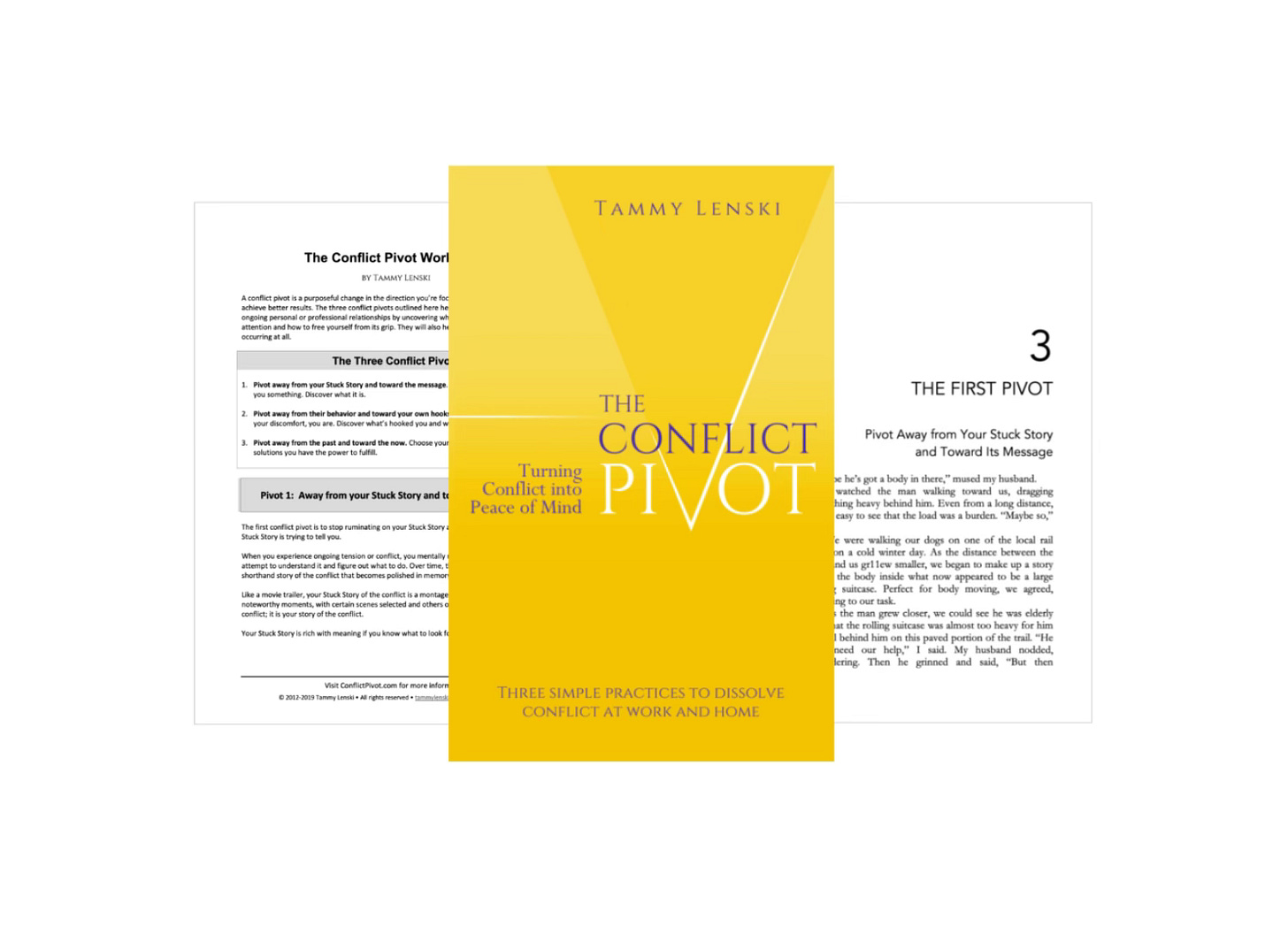Recalibration conversations
For conflict in vital relationships, don't overlook the conversation that comes **before** the problem-solving conversation
Part 4 of 4: Part 1 | Part 2 | Part 3

In the first three parts of this four-part series, we explored the ways Stuck Stories convey essential messages, how knowing your Conflict Hooks helps you distill what you’re really fighting about, and how to stop Rowboating.
So, how do you put these insights to work in a conversation? You have what I call a Recalibration Conversation.
Recalibration Conversations have one goal: to begin easing a strained relationship by discussing what helped fuel the difficult dynamic but has been left unsaid or overlooked.
Recalibration conversations are not problem-solving conversations. Their purpose is not to negotiate a mutually agreeable solution to a disagreement. That comes after the Recalibration Conversation, if it’s still necessary.
Recalibration conversations are for relationships where each wants or hopes to stay in the relationship, such as those with business partners, coworkers, family, and friends.
These kinds of conversations invite discussion of the identity roots that are at the heart of what has been happening: How we see ourselves and how we want others to see us. How we think (or fear) they are viewing us. How to help each other notice when a conflict hook has snagged us. How to handle identity quakes.
An example
In The Conflict Pivot, I wrote about a client who was struggling to care for her elderly father without her brother’s assistance. Linda asked me for help achieving these goals:
Get her brother to give up his playboy lifestyle and contribute to the family like an adult.
Get her brother to visit so he could see how much she and their father needed his help.
Persuade her brother to help with their father’s care.
When we explored conflict hooks, Linda realized that two of her dominant hooks were reliability and fellowship, and that both hooks were feeding her experience of the conflict with her brother. She believed her brother was taking advantage of her dependability (reliability), and the 24/7 care of her father was leaving her without time or energy to socialize, alienating her friends (fellowship). Additionally, because reliability was deeply important to her, she was using it as a measure of her brother — and he was failing to meet her standards.
Linda revised her goals. I wrote in the book,
Once [Linda] realized how many of her real goals she could achieve on her own, she decided that the conversation she most wanted to have with her brother was one in which they could explore the tension between them, with as little defensiveness as possible, and figure out how to begin rebuilding the relationships she had once so treasured.
Linda told her brother that she was aware of the widening gap between them and had been pondering some of the reasons. She told him about her conflict hooks and the ways she experienced his decisions as ways to exploit her reliability. She explained the work she had undertaken to unhook herself. She told him that she wanted to share with him the things she most wanted for herself from here forward and talk about what he most wanted for himself. They had the kind of heart-to-heart she’d been yearning for as long as she could remember.
Issues related to her father’s care did not get resolved in this conversation; Linda, in fact, steered the conversation away from those issues for now. She knew that if she and her brother could reduce the tension between them, they could deal with those issues more successfully later. And she knew, of course, that she already had a viable path to achieve her own peace of mind, independent of her brother’s decisions.
In our last conversation, Linda said to me, “Early in our time together you told me it only takes one to change the dance. I didn’t believe you. But this weekend, I changed my dance steps, and I think I changed my life.”
Recalibration Conversations feel like they’re going to be dangerous, because we’re inviting deeply personal discussion. I won’t tell you it isn’t tricky or that everything will be wonderful on the other side of it. However, after years of coaching graduate students and clients on these kinds of conversations, I’ve seen that most find the conversation less daunting and far more gratifying than anticipated.
Over to you
Here are journaling / conversation / comment prompts for your consideration:
Who do you wish you could have a Recalibration Conversation with?
What would you want to tell them?
What would you want to learn from or understand about them?
How would you invite them to have a conversation like this? What words would you choose?
What are your doubts? How could you address them?
If you’re interested in Recalibration Conversations, learn more in my book:


